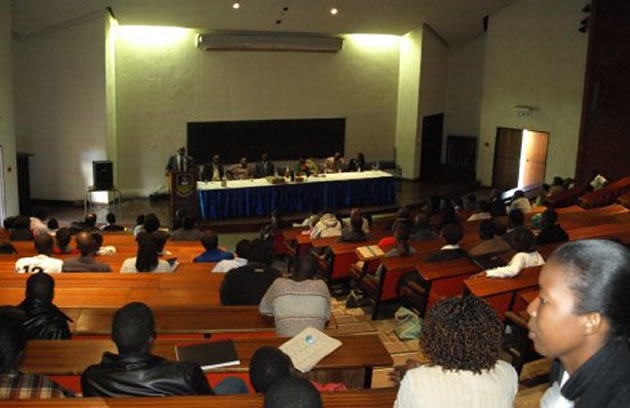Prof Mashiri makes history

 Lovemore Ranga Mataire The Reader
Lovemore Ranga Mataire The Reader
The University of Zimbabwe has scored a first among all local institutions of higher learning to have a Shona-Chinese/Chinese-Shona dictionary that is set to enhance multilingualism among scholars and ordinary people.
Published by the University of Zimbabwe Publications this year, Shona-Chinese/ Chinese-Shona dictionary is a combined effort of Faculty of Arts lecturers; Professor Pedzisai Mashiri (Dean), Yuan Lin, Herbert Mushangwe, Dr Laston Mukaro, Emmanuel Chabata, Victor Mugari, Muchinei Musona, Anastacia Dhumukwa and Godfrey Chisoni.
Explaining the motive behind the project, Prof Mashiri said the compiling of the Shona-Chinese – Chinese Shona dictionary has been motivated by the need to promote multilingual proficiency and inter-cultural communication among speakers of Chinese, Shona and English and also the necessity to collect vocabulary that language practitioners can use and also the increased mobility and interaction among speakers of the three languages in Zimbabwe in particular and Africa in general.
“The dictionary will enhance the University of Zimbabwe’s attempt to promote multilingualism and internationalisation. Multilingualism provides an opportunity for individuals or communities to increase their knowledge, to enhance their understanding of international diversity as well as to expand their influence and participation in socio-cultural, economic and political spheres,” read part of the book’s preface.
The book has also been necessitated by the demand of Chinese as a foreign language in Zimbabwean higher education by non-speakers as a result of economic factors after the European Union and the United States imposed economic sanctions on Zimbabwe after the controversial land resettlement programme of the year 2000 and increased and strengthened economic and political relations between Zimbabwe and China.
Indeed, learning Chinese can be considered the best way to gain deeper understanding of China in several areas that include trade, science and technology, culture, education, tourism and agriculture. After the establishment of the Confucius Institute in 2007, there has been a surge in the uptake of Chinese at the University of Zimbabwe with students opting to undertake the language and shifted from French and Portuguese.
The dictionary is therefore handy to a wide range of users as both a tool for self-teaching Chinese, formal face to face and online programmes and complement existing bilingual dictionaries involving Chinese and other African languages and textbooks. One peculiar aspect of the dictionary is that its bidirectional as the compilers were much more concerned with simplicity and functionality and definitions are not given in the traditional sense of dictionary making as in some cases only simple equivalents are provided.
The English glosses are inputted out of the conscious realisation that most users have reasonable competence in English and can use the knowledge to cross check in either Chinese or Shona.
Quoting Wang Qi and Kenmer (213:34), Prof Mashiri said the written Chinese language comprises some 50 000 different symbols called logograms and a comprehensive grasp of the language requires knowledge of 5000 to 8000 characters but only 1500 characters are found in this book and are considered sufficient for learners to perform basic linguistic and communicative tasks.
The book will also be helpful to Shona speaking people in neighbouring Mozambique, Zambia, Malawi, South Africa and Botswana as they will also be able to use the dictionary in learning Chinesse. Another positive development born out of the establishment of the Confucius Institute is that Chinese scholars at Renmin University Haidian district of Beijing may soon study Shonsa language as a foreign language.
Prof Mashiri who is also director of the Confucius Institute revealed this at an awards ceremony in Harare two years ago. Already, seven local lecturers who received full one year scholarships from the Chinese government have already graduated.
“In promoting cultural exchange, we aim to introduce Shona as a second language in China.
“The CI is in the process of engaging Government to incorporate Chinese in school syllabi,” he said.
Prof Mashiri implored Government to put in place policies that would provide short-term Chinese courses to critical departments such as the army, police, courts and agricultural sectors to improve industry and commerce through communication and trade.
The Confucius Institute provides the context for the production of learning materials suited for specific contexts through the provisions of Chinese learning related courses and programmes at various levels. The levels include academic and professional training university, secondary and elementary school learners, self-enhancing communicative proficiency, Chinese competitions, standard international Chinese proficiency testing or Hanyu Shuiping Kaoshi (HSK), introduction to Chinese culture and consultations for further Chinese studies in China.









Comments